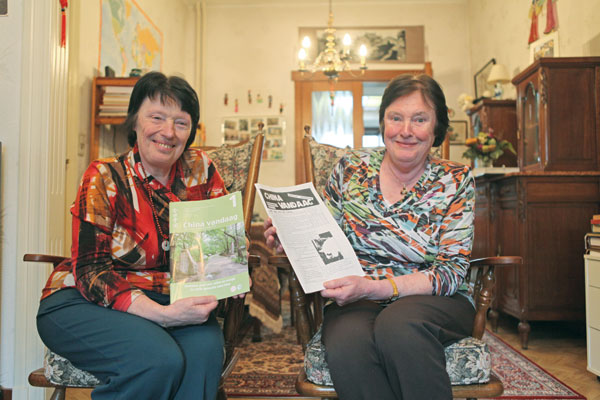
 'Taken 2' grabs movie box office crown
'Taken 2' grabs movie box office crown
 Rihanna's 'Diamonds' tops UK pop chart
Rihanna's 'Diamonds' tops UK pop chart
 Fans get look at vintage Rolling Stones
Fans get look at vintage Rolling Stones
 Celebrities attend Power of Women event
Celebrities attend Power of Women event
 Ang Lee breaks 'every rule' to make unlikely new Life of Pi film
Ang Lee breaks 'every rule' to make unlikely new Life of Pi film
 Rihanna almost thrown out of nightclub
Rihanna almost thrown out of nightclub
 'Dark Knight' wins weekend box office
'Dark Knight' wins weekend box office
 'Total Recall' stars gather in Beverly Hills
'Total Recall' stars gather in Beverly Hills
Sister act leads to China magazine
Updated: 2013-04-05 23:18
By Tuo Yannan and Fu Jing in Brussels, Belgium (China Daily)
|
||||||||
From the outside it looks like a typical Belgian house, but inside the building in Antwerp, lies an Aladdin's Cave of Chinese paintings, calligraphy, books and decorations.
Surprisingly the owners are not Chinese but Belgians with a "Chinese heart" who 30 years ago, in this house, published the first edition of the Flemish-language magazine China Vantaag (China Today).
Lin Tengrootenhuysen and her younger sister An developed an interest in China as kindergarten teachers when they began looking after the children of some local Chinese restaurant owners during weekends.
 |
|
Lin (left) and An Tengrootenhuysen have many fans in China. Fu Jing / China Daily |
Despite the passing of time, memories of those times are still fresh in their minds. "These kids were in our classes, but their parents were working in Chinese restaurants and had to work during weekends, so the community came to us to ask if we were willing to look after them," Lin says.
Pictures of the first child they looked after, a girl, hang on the wall of the house.
"They still visit us every year, and bring their kids here," Lin says.
Through the children and their families the sisters' interest in Chinese culture grew, and to further their understanding of the country they began taking Mandarin lessons at the Belgium China Association.
The year 1979 remains imprinted on their memories: it is when they first set foot in China, as part of a Belgium China Association delegation, to see the hometown of the children they had been taking care of and grown to love.
The visit fascinated them, and fuelled their enthusiasm for China further. On returning to Belgium they were keen to learn more about the country and keep abreast of goings on there, but information proved hard to find. Flemish newspapers and magazines carried almost nothing about China, and so the sisters' hatched a plan to found the first Flemish-language magazine aimed at introducing Chinese culture to Belgium.
It was 1982 when they put their plan into action and began collecting and translating articles about China. The job was tough because of a lack of information.
"We couldn't find anything in the newspapers about China except negative news," An says."Western media did not mention Chinese people's local life or information."
Despite having no knowledge about the publishing business, in January 1983 the first issue of China Vantaag was printed in the sisters' home, which acted as the newsroom, design studio and print room. The sisters are now in their 60s and 70s but they continue to publish the magazine from the house and do all the work on it themselves.
Initially, they printed the magazine at home, page by page. The first issue was a 16-page black and white booklet with a simple binding, but when they held it in their hands it was enough to make both sisters cry with joy.
The cover story was about Chinese New Year and there was a photograph of a smiling farmer holding a large pig because it was the beginning of the Year of the Pig.
The sisters decided to steer clear of political issues and concentrate on culture, local news and travel stories, using the Spring Festival as a start.
One thousand copies were produced, most of them sent to schools and libraries.
Most Viewed
Editor's Picks

|

|

|

|

|

|
Today's Top News
Boston bombing suspect reported cornered on boat
7.0-magnitude quake hits Sichuan
Cross-talk artist helps to spread the word
'Green' awareness levels drop in Beijing
Palace Museum spruces up
First couple on Time's list of most influential
H7N9 flu transmission studied
Trading channels 'need to broaden'
US Weekly

|

|







